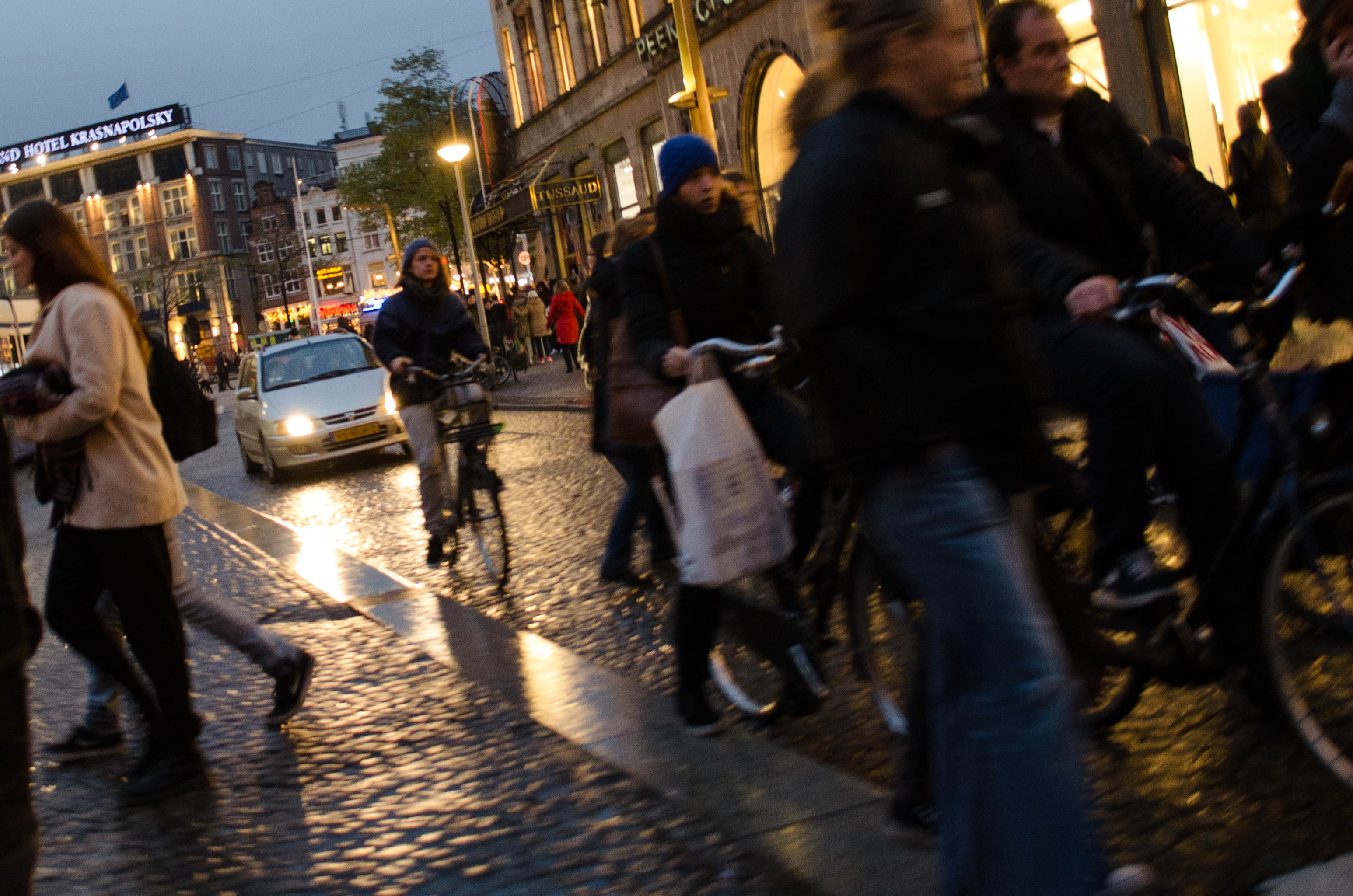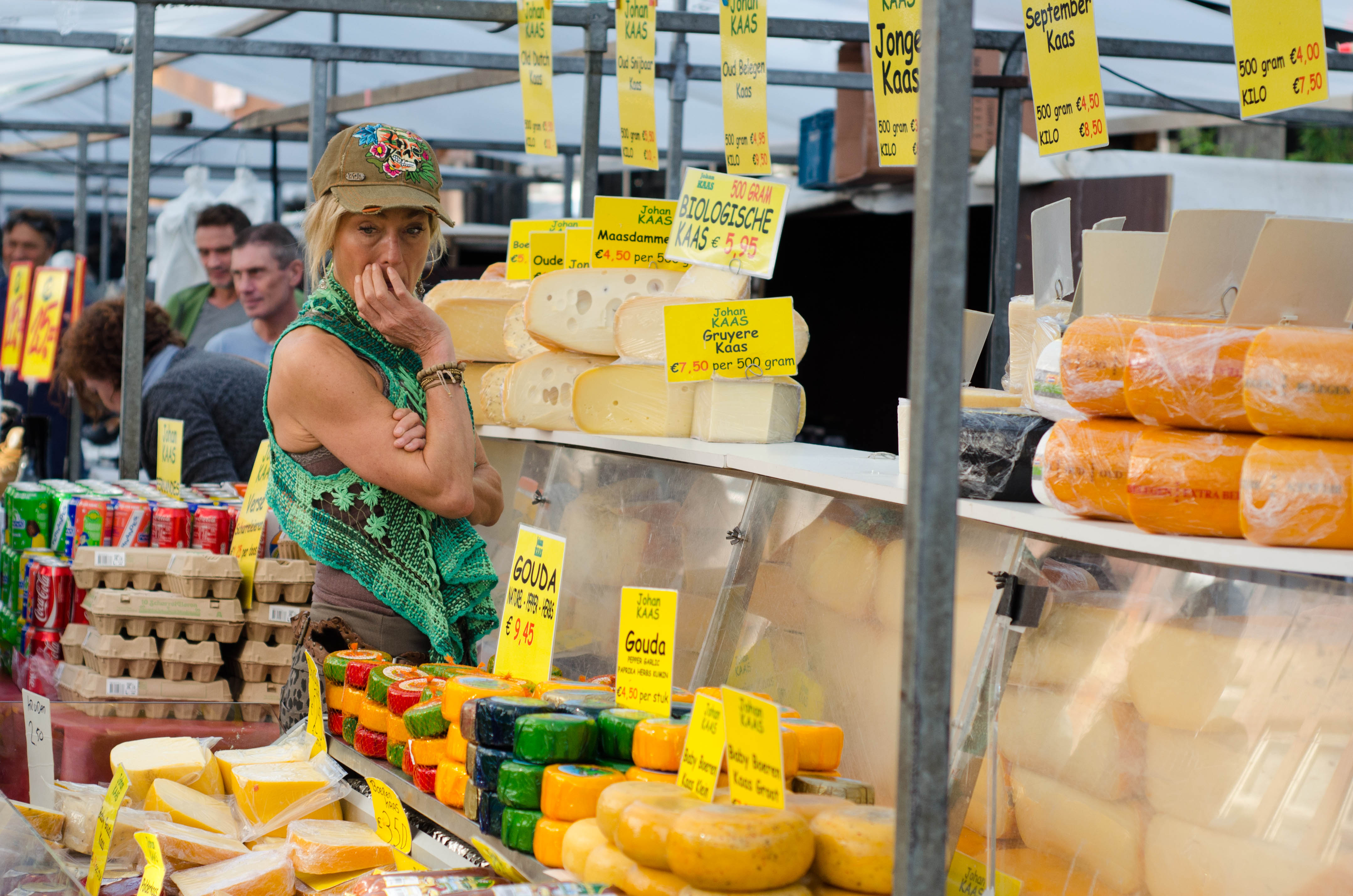It’s hard to believe that I’m fast approaching my two year anniversary as an expat in Amsterdam. The time has really flown and a lot has changed. We’ve come a long way since that first bleary-eyed morning when we arrived at Schiphol with four suitcases and two cats. The hardest part about adjusting to life in Amsterdam has been the tiny aspects of daily life that I had previously taken for granted. There’s the big stuff, sure: different language, different food, different geography and politics. But when you have to re-learn basic life skills in your 30s, it’s a humbling experience. Here are a few of the more trivial differences in Amsterdammer life that threw me for a loop.

Crossing the street
If you live in a city of any decent size, you have developed an innate sense of the rhythm and hierarchy of crossing the street, and chances are you’ve never thought much about it. In Amsterdam, the bike is king, and cars – the scum of the transportation totem pole – are remarkably respectful of this hierarchy. Pedestrians fall somewhere in the middle and it took me a few weeks at least to realize that, if I was anywhere near a street, approaching cars would anticipate my needs and slow down or stop to allow me to cross. Even still, crossing both directions of bike lanes, car lanes, and tram lines can take ages. Sometimes better just to wait for the light.
 Cyclists
Cyclists
One of my Australian friends told me the secret she’d discovered to biking like a Dutchie (which I heartily do NOT recommend) is just never to stop. And she’s not wrong. Zebra crossings don’t mean shit to bikes, and woe be to the tourist who begins to lower a foot off the sidewalk and into the bike path. The first thing you learn when crossing the layered cake of an Amsterdam street is to watch out for cyclists. It’s literally the first lane of traffic you encounter, and the sheer volume of cyclists in Amsterdam means you’re guaranteed to reckon with a bike within minutes of arriving. If you’re foolish or careless enough to take one on, the cyclist will quickly set you straight by ringing god’s gift to passive aggressive Europeans – the bike bell – shouting at you or, equally likely, just blithely running you right over.
 The poop shelf toilet
The poop shelf toilet
It’s a German thing, or so I’m told. A library of dissertations and tweets has already been written about the “lay and display” style toilet, and I’m too embarrassed to go into any specifics. I’ll leave it to your imagination to consider the regular absurdity of doing your business onto a dry, flat surface about six inches below your bum.

Grocery shopping
I had never thought seriously about the fact that the way I buy my groceries is extremely indicative of my nationality and culture. Moving to a major European city, however, pushed that into sharp relief. First and foremost, the food supply chain is different here. People transport their groceries on bicycles and live in tiny spaces. The notion of buying in bulk is moot. How will you get it home? Where will you put it when you get there? So instead, the culture is set up for people to do their grocery shopping in spurts. Gone are the days of the bi-monthly Meijer trip when T and I would fill the trunk of the car with supplies. As a result, the produce is ready to eat on the day you buy it, and doesn’t last as long as the shelf-life friendly American equivalent. Like everything else, this has its pros and cons, but I lean a little towards favoring the European model. Produce is also cheaper here, so it can feel pretty luxurious to buy super-fresh fruit and veg even if I have to do it more frequently.
Another major difference are the hours when the shops are open. I hated the idea of 24 hour shopping even when I was still living in the US and I’m happy to say that living in a country that values life outside work more than the ability to buy cat food at 2AM hasn’t changed my viewpoint. 24H stores are terribly convenient, and there are times when I’ve been frustrated to have to wait to buy something I want. However, the creep of Black Friday into Thanksgiving evening is evidence enough that convenience comes at a price. I’m happy to sacrifice a little convenience for a healthier work-life balance that permeates throughout the culture.
 The postal service
The postal service
Imagine a society with a functional parliamentary system where citizens feel that their interests are more or less represented and their tax dollars are being put to good use. A certain amount of trust is developed between individuals and systemic institutions. People are given the freedom to live or destroy their lives as they see fit, and they demonstrate their gratitude by behaving actually pretty responsibly.
Sounds pretty great, right? Most of the time, it is. Low crime, great public spaces, lots of mutual respect. When the utopic lovefest of trust begins to break down is when it starts insinuating itself into the postal system. Such is the respect amongst citizens that if you are absent when a postal worker attempts a delivery, the package may be casually passed over to one of your neighbors. There’s even an official line on the “sorry we missed you” slip from the postman indicating to which neighbor your package has been handed off. In theory, you’d speculate that this might result in lying, thievery and bloody feuds. In practice, it means you’re obligated to speak to your neighbors occasionally (gross) and sometimes have to repeatedly pass a window through which you can see a box sitting inside your neighbor’s apartment that you know is for you and you know is filled with girl scout cookies for a week while your neighbor is away on vacation.
I do not like this system.
 Tourists
Tourists
I came to this realization embarrassingly late, but if you go to a city because it’s cool, there are most likely other people who are there too, to see the cool things. Still, it’s always a little bemusing to see my city choked with tourists. Seeing a tour bus in Louisville was always a hilarious novelty. LOL, who would take a vacation here? (Louisville, I love you, but you know what I’m saying.)
Giant tour groups are part of the scenery in Amsterdam. This city runs on tourism and it’s evident everywhere. There are entire city blocks devoted only to servicing (hey-oh) tourists. I’ve encountered cities with hoards of tourists, souvenir tchotchkes and dubious dinner theater venues before, but I’d never lived in one.
I go back and forth on a continuum of tourist acceptance. There are days when I love the tourists, slow way down on my bike, smile kindly to everyone and offer directions to people speaking languages I understand. And then there are days when I’m just trying to buy coffee filters and want nothing more than to swat at every cellphone held selfie-high, sending them flying into the canal as I whiz by on my bike.